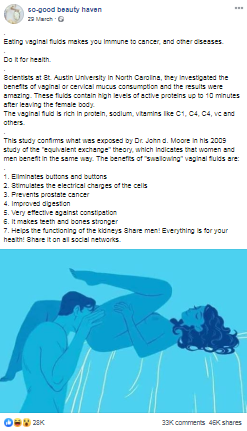
There’s no ‘St. Austin University’ in North Carolina. Ignore posts claiming their research shows that eating vaginal fluid makes you immune to cancer
- This article is more than six years old.
- Published on July 10, 2019 at 09:28
- 2 min read
- By AFP Nigeria, Mayowa TIJANI
A viral Facebook post on the subject, archived here and shared more than 46,000 times, claims that “scientists at St. Austin University in North Carolina” have “investigated the benefits of vaginal or cervical mucus consumption and the results were amazing”. The post adds that “these fluids contain high levels of active proteins up to 10 minutes after leaving the female body”.
Shared with a graphic illustration, the post claims that “the vaginal fluid is rich in protein, sodium, vitamins like C1, C4, C4, vc and others”. The post goes on to list other benefits of consuming vaginal fluid, which includes “prevention of prostate cancer” and making the “teeth and bones stronger”.

The same claims, also citing a St. Austin University, have been posted on Twitter -- in a tweet shared more than 27,000 times -- and on various websites around Africa, including here, here and here.
The posts prompted a variety of responses, many of them humorous. Some users posted links to articles about the high levels of lactobacillus, a probiotic bacteria commonly used in health products, found in the vagina.
However, the claims made in the posts are bogus. There is no “St Austin University” in North Carolina -- you can find a map of US colleges here.
There is a St. Augustine’s University in the US state, but there is no published research from the university making any such claims about a link between the consumption of vaginal fluid and immunity against cancer.
Is there a link between oral sex and cancer?
The Oscar-winning actor Michael Douglas caused a stir in 2013 when he told an interviewer that his throat cancer was “caused by HPV, which actually comes about from cunnilingus”.
HPV is human papillomavirus, a common sexually transmitted infection.
As noted in this information sheet published by Britain’s National Health Service, “HPV does not directly give you cancer, but it causes changes in the cells it's infected (for example, in the throat or cervix) and these cells can then become cancerous. If cell changes do happen, it can take a long time, even decades. Very few people infected with HPV will develop cancer. In 9 out of 10 cases, the infection is cleared naturally by the body within 2 years.”
Copyright © AFP 2017-2026. Any commercial use of this content requires a subscription. Click here to find out more.
Is there content that you would like AFP to fact-check? Get in touch.
Contact us
